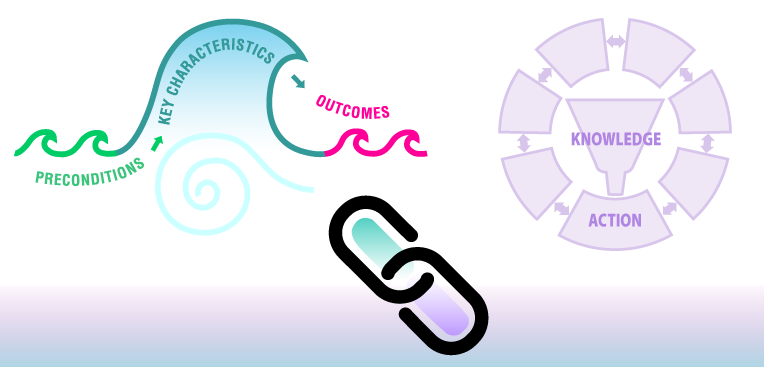

Linking this outcome to other elements of the Social Movement Action Framework:
Each of the elements of the Social Movement Action (SMA) Framework is dynamic and interrelated. For example, goals and outcomes are met are directly related to the key characteristic of individual and collective action. The degree of completion of goals is also reflected in the momentum sustained in the social movement and the development of a collective identity of those engaged in the change. The achievement of goals also relates to framing or how the shared concern or strongly desired change is positioned and whether it continues to be viewed by individuals as credible, important and urgent.
Linking this outcome to the action cycle phases of the Knowledge-to-Action Framework:
You and your change team’s capacity in social movement actions may be enhanced and/or accelerated by the addition of some of the action cycle phases of the Knowledge-to-Action (KTA) Framework, as the two frameworks are complementary. In addition to the linking example described earlier in this section, there can be many other points of connection between the two frameworks. Below are three more examples for your consideration:
- Adapt knowledge to local context: Assessing the local context in which individual and collection action is carried out, the stakeholders involved, and the resources available can help you and your change team determine why the goals of your social movement are met fully and/or partially. Questions to ask: Why are some social movements successful but not others? Why do some practice changes become part of the workflow, while others do not make it to standard practice?
- Evaluate outcomes: This phase of the KTA action cycle can guide you and your change team through your review and evaluation of your social movement. Questions to ask: Did your social movement achieve the intended outcomes you and your team had set out to achieve? The suggested tools in the KTA phase of evaluating outcomes can help you navigate these questions.
- Sustain knowledge use: This phase of the KTA Framework can help you with some approaches you can take to ensure that your goals are sustained for the long term. Question to ask: Goals may be reached, but how long can the changes that you led be sustained in your setting? You and your change team can consider ways to sustain the changes you initiated.
For more discussion about the dynamic links between the elements of the SMA Framework to one another and to the KTA Framework, see the section 'Accelerate your success with the Leading Change Toolkit™’.
